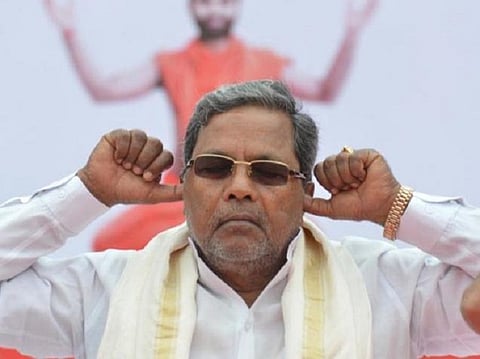

Karnataka is heading for polls and one of the largest vote banks in the state – the Dalit community – has put forth demands for internal reservation in the community.
With uncertainty looming over the way the Dalit community may swing in the upcoming polls, Chief Minister Siddaramaiah is playing safe and has ordered the formation of an expert committee to probe the feasibility of the demand for internal reservation.
On Sunday, Siddaramaiah met Dalit leaders representing various sections of the community to discuss their demand of implementing the Justice Sadashiva Committee Report.
In 2012, the Justice AJ Sadashiva Inquiry Commission had recommended internal reservation among the castes for equitable distribution of the overall reservation of 15% to Scheduled Castes.
The report recommended classifying the 100 odd castes into four groups – Right Community, Left Community, Touchables and Other Scheduled Castes.
Sources in the Congress said that the Dalit community of Chaluvadis strongly opposed the demand for internal reservation put forth by the Madigas.
“The Chief Minister has assured the leaders that no one will lose out on any benefits and has asked the leaders to hold off the issue until the upcoming polls. The Madiga community wants the Sadashiva Committee Report to be implemented as they will stand to benefit from it. However, the Chaluvadi community does not want that as they will lose the upper hand. Hence an expert committee will be formed to look into the issue,” the Congress source added.
Social Welfare Minister H Anjaneya and former Union Minister KH Muniyappa, both belonging to the Madiga community, have been rallying for the Sadashiva Committee Report to be implemented. Congress sources say that several Chaluvadi leaders have been trying to derail their efforts.
Speaking to TNM, noted political analyst Sandeep Shastri says that the expert committee is only a way of pushing an issue that the government does not want to deal with.
“Since the elections are coming up, the pressure groups representing various sections of the Dalit community will bring out their issues and go to the ruling party and the opposition to ensure that their demands are met. When the government feels cornered, then it forms an expert committee, which will delay deadlines and the demands are ultimately sidelined,” Sandeep added.
Sandeep maintains that the Mada and Madiga community along with other Dalit minorities are the ones who feel cornered as they have not been able to reap the benefits of reservation compared to the Chaluvadis.
“Since the Congress does not want to displease either the Chaluvadis or the Madigas, Siddaramaiah has played safe. This is obviously done because he does not want to risk losing votes in the 2018 elections,” he added.
Popular opinion is that the Dalit votes lie with the Congress. So why is Siddaramaiah playing safe?
The Congress has always projected itself as a party which has championed the cause of Dalits. The Dalit community, one of the largest vote banks, had for a very long time sided with the Congress, while the upper castes have voted for the BJP.
Siddaramaiah too has branded himself as the champion of Ahinda (an alliance of scheduled castes, scheduled tribes, other backward castes and minorities). However, Congress sources believe that his leaning towards the Chaluvadi community may have alienated a certain section of the Dalit community.
Speaking to TNM, B Gopal, former state president of the Bahujan Samaj Party, says that unlike popular opinion, the Dalit vote bank has always been the most unreliable one.
“That’s why leaders are always trying to please this community since most of the vote bank is vulnerable. Congress has probably 2-3% guaranteed Dalit votes from the Chaluvadi community. That is just one section of the Dalit population. There are a total of 101 castes among Dalits themselves. This huge chunk has no said pattern of voting. They will vote only for the leader whom they feel has their best interests,” he adds.
Corroborating Gopal’s statement, Sandeep says that another reason the Dalit votes are extremely vulnerable is – all the political middlemen who influence the 1,900 odd groups within the community.
He says that after 1980, the Dalit community in the state has never voted for a specific party.
“Since 1980, Chaluvadis have always supported Congress. But since 2001-02, the Dalit left vote split between the Janata Party and the BJP. Ever since, it has been unpredictable as to which way the community will swing,” he adds.